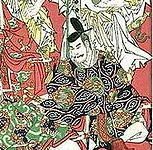About Emperor Kōkaku
- Emperor Kokaku (????, Kokaku-tenno, 23 September 1771 – 11 December 1840) was the 119th Emperor of Japan, according to the traditional order of succession.
- Kokaku reigned from 16 December 1780 until his abdication on 7 May 1817 in favor of his son, Emperor Ninko.
- After his abdication, he ruled as Daijo Tenno (????, Abdicated Emperor) also known as a Joko (??) until his death in 1840.
- The next emperor to resign of his own accord was Akihito, the Emperor of the Heisei Era, in 2019, 202 years later. Major events in Kokaku's life included an ongoing famine that affected Japan early into his rule.
- The response he gave during the time was welcomed by the people, and helped to undermine the shogun's authority.
- The Kansei Reforms came afterwards as a way for the shogun to cure a range of perceived problems which had developed in mid-18th century but was met with partial success. A member of a cadet branch of the Imperial Family, Kokaku is the founder of the dynastic imperial branch which currently sits on the throne.
- Kokaku had one spouse during his lifetime, and six concubines who gave birth to sixteen children.
- Only one son survived into adulthood and eventually became the next Emperor.
- Genealogically, Kokaku is the lineal ancestor of all the succeeding Emperors up to the current Emperor, Naruhito.
Read more at Wikipedia


 Date of Birth:
Date of Birth:  Place of Birth: Kyoto, Kyōto Prefecture, Japan
Place of Birth: Kyoto, Kyōto Prefecture, Japan